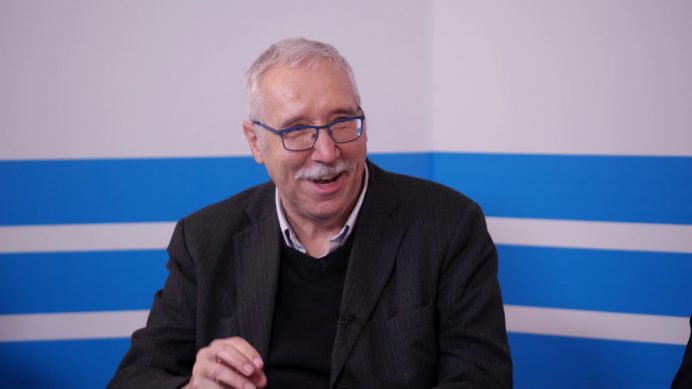Gerald M. Steinberg is the Director of NGO Monitor. Fathom published his supportive response to the Israel government’s decision to redesignate six Palestinian NGOs, as well as a much more critical reaction from David Davidi-Brown, CEO of NIF UK. Steinberg has penned this reply to Davidi-Brown.
Writing on behalf of the New Israel Fund (UK), David Davidi-Brown’s remarks on the Israeli government’s designation of six Palestinian NGOs as terrorist fronts were disappointingly devoid of substance. Instead of carefully weighing the facts, Mr. Davidi-Brown repeats ideological tropes and political spin that deny the existence of detailed evidence and substitute allegations of a nefarious Israeli government plot against human rights, ostensibly led by Defense Minister Gantz.
In contrast to the effort to trivialise the classification of the six groups as arms of the Popular Front for the Liberation of Palestine (PFLP), plus a seventh named in May, the process follows a complex evidence-based procedure involving a number of officials, including the Attorney General.
The most blatant evidence of NGO terror links, entirely erased in the NIF-UK response, emerges from the August 2019 murder of Rina Shnerb, which in addition to being attributed by Israel to a PFLP cell, was claimed publicly by the organisation itself. Five NGO officials were among those arrested for financing the operation, recruiting the cell members, placing and then detonating the explosive that killed Rina and injured her father and brother. Samer Arbid was financial director of the Union of Agricultural Work Committees (UAWC) at the time of his arrest, and had previously been among the leaders of Addameer, an NGO claiming to promote human rights that advocates for PFLP prisoners. Both NGOs were among the six designated as terror fronts in October. Abdul Razeq Farraj, another UAWC official, was also indicted for his role in this attack.
The attempt to dismiss this and the other details systematically linking the PFLP to a network of NGOs as ‘guilt by association’ or the actions of a few individuals, with no implications for the activities and agendas of the organisations, is deceitful. Similarly, in making his case, Davidi-Brown ignored the open-source evidence, posted on social media and in Youtube videos, published by NGO Monitor, showing direct links between more than 70 PFLP officials and many of the NGOs involved. The picture that emerges from this independently verifiable research is not consistent with the claim that banning the organisations as terrorist fronts is nothing more than a ‘smear campaign’ fabricated for political objectives.
Beyond the politics and ideology, the implications of the Israeli decision and the counter campaign, involve a great deal of money. The seven NGOs and their close allies receive most of their funding – amounting to millions of Euros annually – from European governments as political subcontractors, under the labels of promoting human rights, economic assistance and similar objectives. Officials, some of whom have long records of cooperation with the heads of these Palestinian NGOs, have been understandably reluctant to acknowledge major errors in judgement. In making the terror designations, with an emphasis on diversion of funding from the NGOs to the PFLP, including payment of salaries of terror leaders, the Israeli government is urging the European funders to consider the evidence and reconsider these policies.
To counter this effort, the NIF-UK version (citing unnamed ‘civil society experts’) substitutes the actual evidence with claims regarding a secret dossier allegedly circulated by the Israeli Security Agency (aka Shin Bet) to European funders in May. Davidi-Brown alleges that this dossier focuses on ‘two former employees of a different organisation [the Health Workers Committee] – not one of the six currently targeted – [who] were fired, and subsequently arrested …. These men confessed in custody (under unknown conditions) that they had funneled money to the PFLP. These workers also listed the six organisations under discussion today as organisations as “known as PFLP organisations” and “part of the PFLP NGO network.”’ Basing his case on unverifiable allegations from six months before the designations were made, and related to an artificially narrow focus, is not credible. (Recently, a HWC staffer in charge of fund-raising in Europe pleaded guilty to having diverted funds from their intended objective to PFLP terror activities.)
Similarly, the claim that the organisations involved are ‘pillars of Palestinian civil society’ devoted to human rights, protecting children, and promoting due process of law should be taken with a large grain of salt. In addition to the terror links, the six NGOs promote demonisation of Israel, including campaigns that cross the line into antisemitism. Al Haq (whose General Director Shawan Jabarin has a long history of PFLP links) is among the leaders of the European-funded efforts to label Israeli counter-terror policies as ‘war crimes’ including in the infamous 2001 Durban conference. An occasional criticism of internal rights violations by the Palestinian Authority or Hamas is more of a token, and clearly not the primary focus of the organisation.
Stepping back from the specifics, it is important to question the motives behind this attempt to counter the Israeli designation. According to Davidi-Brown, ‘the New Israel Fund UK does not work directly with these Palestinian groups…’ but this is misleading. The NIF core political advocacy groups, such as B’tselem, Yesh Din and Breaking the Silence, among others, frequently partner with Al Haq and other PFLP-linked NGOs in media campaigns and submissions to UN bodies that target Israel. If their Palestinian partners are widely discredited and European governments ended their involvement, this will also harm the credibility, reputation and funding for the NIF’s NGO network.
For the same reasons, the initial responses of the ministers representing the Left in the current Israeli government coalition – Nitzan Horowitz and Tamar Zandberg from Meretz, and Merav Michaeli from the Labour Party – also criticised the NGO terror designations. However, after they were briefed by the ISA on the evidence, they became silent. Perhaps if the New Israel Fund, including Davidi-Brown, examined the facts honestly instead of reflexively dismissing them, they would acknowledge at least the possibility that the PFLP has exploited the facade of human rights and civil society to advance its terror activities.




































